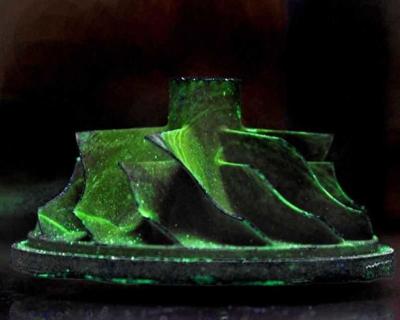
Chemetall has introduced a new water-based penetrant for eco-friendly and process efficient fluorescent penetrant inspection. Britemor 921 (W) enables bright and crisp indications on a wide range of materials, including ferrous and non-ferrous metals, and non-porous ceramics, thanks to its very low fluorescent background and excellent wash characteristics. Chemetall's liquid penetrant testing product uses water as the main carrier which is stabilized by a distinctive micro-emulsion technology. These micro-emulsions are thermodynamically stable and composition includes isotropic liquid mixtures of solvent, water and emulsifier. The low viscosity of the Britemor 921 (W) ensures minimal drag out, reduces overall product and rinse water consumption and minimizes the effluent treatment costs.
The sound ecological properties of Britemor 921 (W) are based on its very favorable Chemical Oxygen Demand (COD) and Biological Oxygen Demand (BOD) values compared to current generation products. Equipped with a very low COD/BOD ratio, Chemetall can offer its customers a more biodegradable product. The overall low COD and BOD values of Britemor 921 (W) reduces the amount of contaminants in the rinse water. Consequently, the process requires less consumable, such as activated charcoal, to adsorb organic load in the waste water. Complemented by a low toxic unit value, Britemor 921 (W) offers the opportunity of a direct discharge to the drain, depending on local water, environment authority regulations.
Britemor 921 (W) can be used with all existing Chemetall developer systems (PD3, LD9, water-based developers) or as a self-developing process, avoiding the additional usage and the costs of an extra developer product. The innovative technology is classified Level 1 in accordance with EN ISO 3452-2 and offers many benefits to the automotive components market, general industry foundries and NDT inspection/service companies with regard to process cost savings, environmental aspects and performance enhancement.
Contact Details
Related Glossary Terms
- ceramics
ceramics
Cutting tool materials based on aluminum oxide and silicon nitride. Ceramic tools can withstand higher cutting speeds than cemented carbide tools when machining hardened steels, cast irons and high-temperature alloys.
- nondestructive testing ( NDT)
nondestructive testing ( NDT)
Same as nondestructive inspection but implying use of a method in which the part is stimulated and its response measured quantitatively or semiquantitatively.
